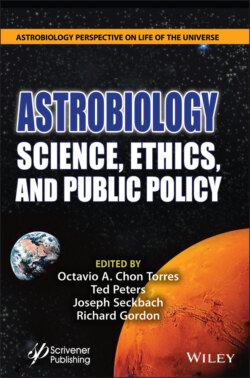Читать книгу Astrobiology - Группа авторов - Страница 26
2.2.2.1 Science and Value
ОглавлениеThe question—What do we value?—takes on complexity and nuance when drawing science into the picture. The place of science raises two challenges. First, if science is value-neutral, then all the ethicist can do is paint values over science, distorting science. Second, whichever moral color the ethicist selects will seem to be arbitrary, merely the color of the moral painter’s subjective choice. Let us look at these two challenges in turn.
First, should we paint science with an ethical brush? If we do, would ethical deliberation distort value-free science? Or, should we ask a bit critically: Can science actually claim to be value-neutral in the first place? Scientists certainly strive for objectivity, employing multiple tests by blind referees to confirm or disconfirm a hypothesis. Such honest rigor is to be commended, even applauded. Yet, beneath the value-free patina, scientific research is always guided by either a worldview or by someone’s vested interests. Big science as practiced today requires funding, and funding is supplied only by funders who are expressing their agendas.
Money talks. Power speaks. Space Studies researcher Mark Bullock alerts us to the force of financial influence. “The role science will play in determining the quality of life for every human being on the planet is of course determined by the elite that funds science. In this way all scientific enterprise is embedded in the greater moral problem of how individuals and groups should conduct themselves” [2.10].4 In short, follow the money.
However, following the money is not enough. All moral issues cannot be reduced to money. A more subtle concern must be addressed. We must ask whether values or morals or obligations are inherent to scientific research and technological development, or if the ethicist must add it. Alternatively, we might ask whether values are inherent to the subject matter science studies—namely, nature—so that, even if science is value-neutral, nature is not?5 Might we find value concerns rising up either from nature itself or from the science we employ to explain nature? If the answer is affirmative in either case, then science and value come together in a single package; and to separate science from value would constitute an abstraction.
To say it another way: human life is fundamentally and inextricably embedded in nature; and this embeddedness is already value-laden. Therefore, when the scientific method excises only objective data from our already value-rich experience with nature—drawing a picture of nature as valueless—this amounts to an abstraction. The value-free conclusion of science is actually an assumption; it is a circular argument that does not account for our fundamental relationship of the human within nature.
Despite the abstractive component to this method, we will operate here with the hypothesis that ethics and what science learns about nature are co-original; they belong together in the relationship between nature, science, and the wider culture.
When nature herself emits value, the ethicist does not simply paint values over an otherwise neutral physical world. The ethicist needs to demonstrate that the values already at work in scientific discovery can be subjected to analysis, their presuppositions exposed and made available for ethical critique. With existing value assumptions then out in the light, the ethicist can coax the researcher toward self-conscious realism, authenticity, and care. Research scientists, in large part, concur. UNESCO rejoices in that “the world of scientific and technical research now regards ethical reflection as an integral part of the development of its own domain” [2.30]. An Astroethics of Responsibility will rely on the hypothesis that science and ethics belong intrinsically together; and we will see just how illuminating this exercise might be.
